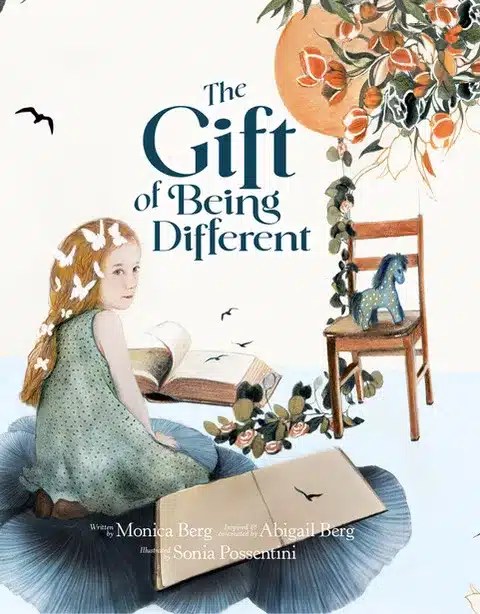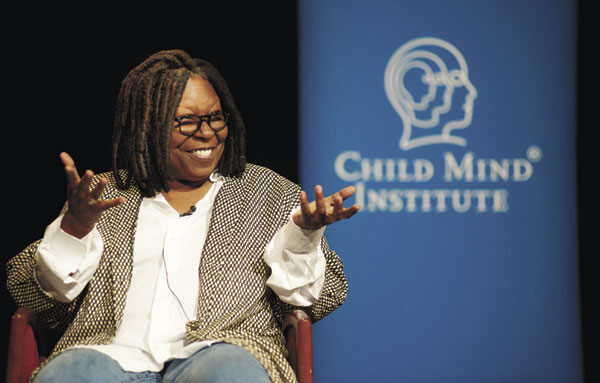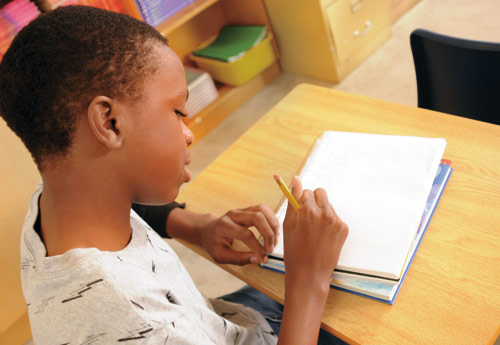
Author Monica Berg on The Gift of Being Different
When Monica Berg learned that her daughter, Abigail, was dyslexic, she didn’t tell her daughter about the diagnosis right away. Not because it was something to be ashamed of, Berg says.
“I first wanted to understand more about it so I could relate to what she must be feeling and experiencing,” Berg says. “And I also wanted to make sure that I would be able to frame it in a way that she saw it as something positive versus negative.”
But while Monica was trying to figure out the best way to discuss the topic, Abigail came to her first.
“She said, ‘Do I need so much help because I’m stupid?’” Berg says. “And of course, everything that moment I stopped.”
Monica and Abigail talked about dyslexia in a positive way, how it just means that Abigail just learned differently and examples of other people who had dyslexia. Abigail’s feelings towards her dyslexia changed dramatically.
“She went around, actually, to all of her friends and all of our family members and she said, ‘I have a superpower: it’s called dyslexia. What’s yours?” Berg says.
Monica and Abigail are working together to teach children and parents that the traits that make us different are the superpowers that make us strong in their newly-launched children’s book The Gift of Being Different.
We sat down with Monica about what makes dyslexia a superpower, the process of writing the story with Abigail and what parents can learn from their children.
Psst… Here’s where to see Cherry Blossoms in NYC this year!
You wrote this story with your daughter, Abagail. What was that experience like?
The experience of writing the book together has given Berg the opportunity to watch Abigail “really come into her own and build confidence.”
“Just to see her kind of discover her own voice has been really powerful,” Berg says.
While creating the story, Monica and Abigail worked together and morphed their childhood experiences together to create the story’s main character.
“That’s the fun part of storytelling,” Berg says. “We can take a little bit from my childhood, a lot from [Abigail’s] and put the experiences together because everybody has those experiences.”
Throughout the creation process Berg was also able to teach Abigail that you can write a book before being able to read exceptionally well. Berg said all you need to do is have an idea, believe in your voice and have a desire to put that idea into the world.
What makes dyslexia a superpower, and how were you able to express that idea to your daughter?
Berg said she helped Abigail highlight unique qualities that she has, like how she sees things as pictures instead of words and how she has a great imagination, and how these unique qualities can be useful.
“When you reframe it and understand things about yourself, and then you understand you just have to learn how to use those things, then you can see it as the superpower that it is,” Berg says.
While many people are raised to think that things that make us different are a bad thing, those things make life unique and interesting, Berg says.
“That’s the really inspiring part about writing the book is that everybody has something,” Berg says. “And it’s really something beautiful if you aren’t afraid of it and you don’t try to hide it and you don’t try to change it, you kind of just grow into it.”
How can parents talk to their children about the things that make them different?
Many times, conversations like these start with the child. Berg said parents can foster these conversations by creating an environment where children feel comfortable expressing that they need extra support or that they feel different.
A big part of fostering this environment is for parents to not show their fear to their children. Even when there’s an obstacle, Berg says parents need to remember that every problem has a solution and they should approach problems with this mindset.
“Your child will look at you and they’re going to mirror your reaction to whatever it is they’re feeling,” Berg says.
It may seem difficult to avoid projecting your own fears onto your children; Berg says it’s important to remember that “your child is not you” and they don’t always need protecting.
“You don’t need to save them from any pain,” Berg says. “We’re all going to experience the ups and downs and the ebbs and flows of life, and they all have a meaning and a purpose.”
While parents shouldn’t show fear to their children, they shouldn’t hide that problems exist either. Children are aware when they need extra help, and avoiding the topic creates the idea that needing extra help is a bad thing.
“Not talking about it just creates the idea that it’s something to be embarrassed about or be ashamed of,” Berg says.
Why do you think this story, The Gift of Being Different, is important for parents and children?
Being different is “the fact of life,” Berg says.
Berg says she hopes this story helps parents and children alike celebrate things that make us different and make us stick out from the average.
“Really, it’s the outliers in life that do great things, become great things,” Berg says.
In order to navigate life to the fullest, Berg says it’s important to remember that “you’re different, I’m different, we’re all different, and that’s exactly how it’s meant to be.”















